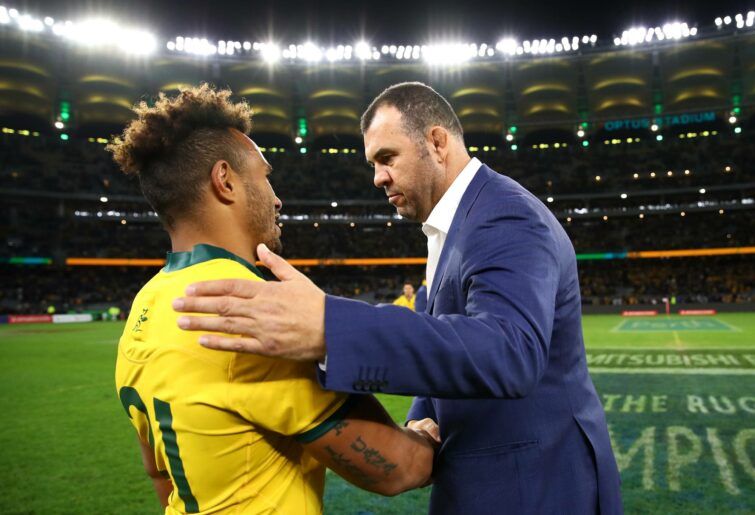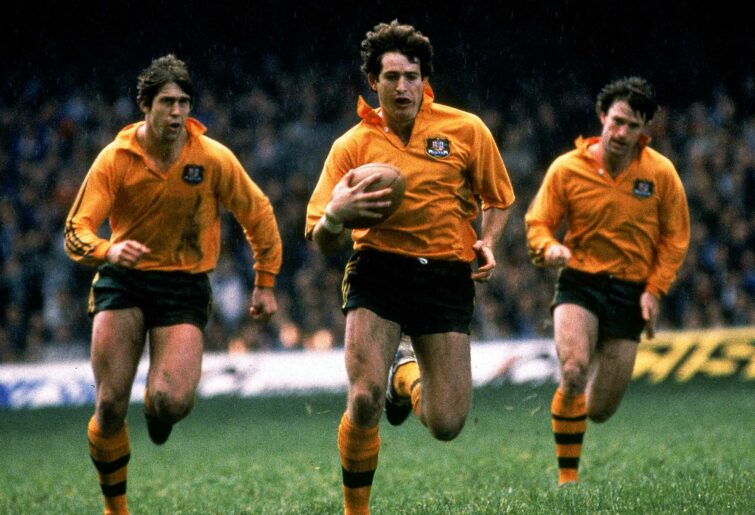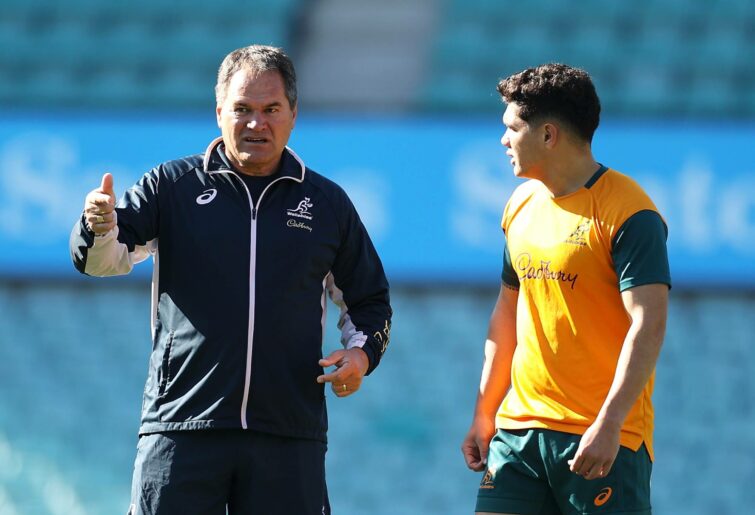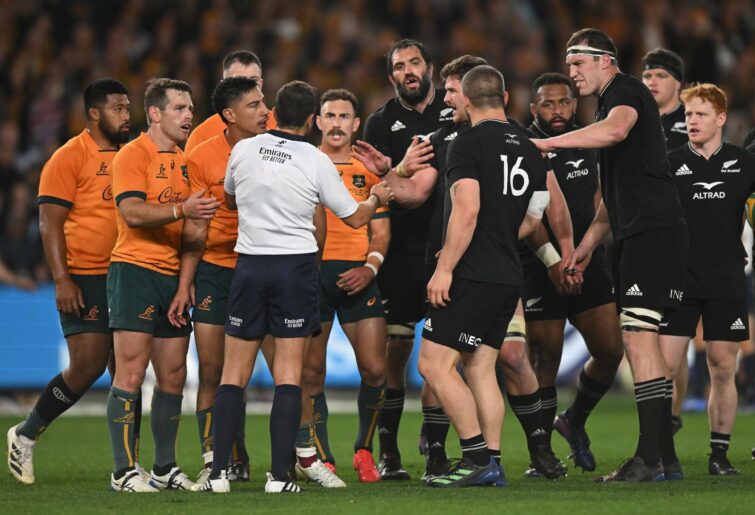A strange thing happened on Thursday night in Melbourne.
“Thanks, captain obvious,” I hear you say. Four days on, nobody needs reminding of one of the most contentious finishes to a Test match in living memory, with the All Blacks sneaking a 39-37 after-the-siren win against the Wallabies.
No, something else happened in the aftermath that seems counter-intuitive and worthy of further examination.
The Wallabies lost their 14th match under coach Dave Rennie, which sits alongside 11 wins and three draws. For the mathematically inclined that represents a 39 per cent win record, a ratio that would have most ‘tier one’ rugby coaches under extreme pressure to retain their position.
Yet the prevailing mood post-match was that while the Wallabies went down, Rennie’s stocks went up.
To borrow a question oft-posed by Professor Julius Sumner Miller, “why is it so?”
When it comes to hunting down, knifing and finishing off rugby coaches, Australia does it as well as any country. Since the advent of professionalism in 1995, prior to Rennie, the Wallabies have had seven coaches. Only two, Rod McQueen and John Connolly, can be said to have left the job of their own accord, at the end of their contract term.
The others – Greg Smith, Eddie Jones, Robbie Deans, Ewen McKenzie and Michael Cheika – were all terminated or resigned under the threat of impending termination or non-renewal.

(Photo by Cameron Spencer/Getty Images)
All seven coaches left the job with winning records of 50 per cent or better.
On the surface, that paints Rennie in a bad light, but there is more to the story. Connolly finished his term in 2007 with a winning rate of 64 per cent. Subsequently, Deans finished in 2013 at 59 per cent, followed by McKenzie and Cheika at 50 per cent. As coaches, none of these men won a Bledisloe Cup.
With Rennie now nudging under 40 per cent, you don’t need to be an expert in regression analysis to identify a trend everybody already understands. Since the Wallabies narrowly lost the final of the 2003 World Cup, they have been in decline.
This all points to a gathering tidal wave; a force so powerful it is unable to be withstood by any coach. It’s also a classic case of the man with the clipboard being held accountable for fundamental flaws in the Australian rugby system, far beyond his control, or ability to remedy alone.
Into that mix can be thrown deficiencies in coaching pathways, player skills and conditioning, participation numbers, talent identification and retention; a lack of hunger and competition for high-performance places, intense competition from other cashed-up sports, political and structural impediments and administrative hubris.
None of those factors excuse Rennie’s results but they do provide context.
On what basis should he be measured? Achieving a win percentage benchmark that other well-credentialed coaches before him failed to meet? Or a more subjective assessment that takes into account his starting position?
It is the latter – an emphasis on qualitative rather than quantitative factors – that account for Rennie being provided with a ‘leave pass’ of sorts.
Accompanying that, are an array of circumstances and obstacles that were at the heart of Rugby Australia chairman Hamish McLennan’s public statement of support for Rennie in the hours before last week’s Bledisloe Cup match.
The Roar rugby expers Brett McKay, Harry Jones and Jim Tucker reflect on the big call in our podcast. Stream it here or on your app of choice
McLennan made it clear that Rennie isn’t going anywhere and will – at a minimum – see out the term of his contract, up to and including next year’s World Cup.
Usually, such a “full support of the board” exhortation starts the clock ticking on a messy exit, but despite the loss that followed, and expectations of another to come at the All Blacks’ Eden Park fortress, nobody truly believes Rennie is under any undue pressure.
Eighteen times the Wallabies have visited Auckland in the professional era, for 18 losses. The points differential across those matches is 604 to 250, at an average match score of 34-14.
Incidentally, that mirrors the 34-15 score-line in 1999, the year Australia last won the World Cup, which again shows how hard it is for any team to go to Eden Park and win.
The last time any side achieved this was France in 1994. The last time Australia won there was in 1986, by 22-9, when David Campese was at the peak of his powers and all of New Zealand’s points were off the boot of Kieran Crowley, kicking front-on, square-toed.

(Photo by Getty Images)
The obvious point to be made here is that the constant in all of this isn’t the Wallabies coach. Rennie is just one of a line, all playing the imperfect hand dealt to them.
Where else can we look for pointers? In Test matches under Rennie where the final result has been under 5 points, the Wallabies have won five, lost five and drawn three. They are neither frail under the pressure of a tight match nor are they particularly nerveless or lucky.
They simply win or lose their fair share of close ones.
Indeed, the Melbourne Test demonstrated just that. A brave and skilled comeback, an unlikely win snatched away by – depending on your viewpoint – extravagantly unsympathetic refereeing, or a Wallaby fly-half caught pushing the barrow out slightly too far, once too often.
Cohesiveness and teamwork index (TWI) are indicators in popular use in professional rugby, and while Rennie suggested at the start of this season that he would look for greater continuity in selection – pick and stick in the old language – he has been denied this opportunity.
The Wallabies aren’t the only side to have suffered injury, but they have had more than their fair share, and continue to suffer. Throw in suspension and arrangements such as that made for overseas based players, including for Samu Kerevi to attend the Commonwealth Games sevens, and the return of captain Michael Hooper from Argentina, and it’s been more of a case of selection on the run.
From the first choice XV against England in Perth, to last week’s Bledisloe Cup match, a period of 10 weeks, only seven starters remain. That’s no basis by which to create and weld in combinations that can excel and endure at Test level.
A forthright and intelligent James Slipper has impressed as stand-in captain – but even he is in extreme doubt for Eden Park, with a troublesome calf.
And whatever Slipper’s merits, Rennie could not have counted on the loss of his captain Hooper, and one of his lieutenants, defence coach Matt Taylor.
In other sports, or say under the intense spotlight trained on Eddie Jones and Ian Foster, Rennie would be facing intense questioning and scrutiny around these departures.
That this hasn’t happened speaks to a media respectful and sensitive to the personal situations of both Hooper and Taylor, and also further recognises that Rennie himself is an authentic and genuine man who commands respect.

(Photo by Mark Kolbe/Getty Images)
The contrast is clear. The Wallabies’ results are nowhere near the level desired by anyone involved in the game in Australia. But almost every person close enough to the action to see what Rennie and his co-coaches are doing with what they have at their disposal, has only good things to say.
Rennie is no fool; he knows rugby backwards and he has struck the right balance in knowing when to empathise with individual players and when to turn the heat up and make players accountable for non-performance.
He has ensured that the culture and togetherness of the Wallabies is strong. Selection – while there are always pockets of disagreement over players here or there – is roundly accepted as sound. The set piece is at worst competitive, and at times highly effective. Some new players have made promising contributions.
But depth in some key positions remains a concern, and the ability of the side to perform consistently, from match to match and within matches, remains a major inhibitor.
There are also little slip-ups. Anyone who saw Rob Leota train the day before last week’s match knew his achilles/calf was a risk. As manfully as Leota played while he was on, in retrospect, harder decisions might have been made.
A sub-40 per cent success rate cannot be ignored. It is roundly disappointing. But in this time when coaches are over-simplistically and prematurely labelled as “great coach” or “can’t coach”, it is only one measure, not the measure.
That’s one of the reasons fans filed out of Marvel Stadium last week filled, not only with disbelief and disappointment, but with a cautious confidence that Rennie’s Wallabies are indeed on the right path.
It was as if they had just seen Sebastien Vettel complete the final lap of the Albert Park grand prix circuit with a flat tire, overtaken in the final straight for the win. Another frustrating and disappointing loss to be sure, but with enough daring and courage not to diminish appreciation for the skill of the driver.
Rennie likes to talk about opportunities, and his squad gets another one this weekend at Eden Park. And if that goes south, like so many before have, then they get five more opportunities starting on the 30th October, against Scotland, France, Italy, Ireland and Wales.
At some point, Rennie’s inputs will need to be matched by output, i.e. wins on the board. With the shadow of next year’s World Cup looming, this tour is where it starts.
With one round remaining the Rugby Championship sits on a knife’s edge, with New Zealand and South Africa equal on points at the top of the ladder. Mathematically, Australia, and even Argentina, remain in the hunt, but both need a miracle to win the tournament from here.

(Photo by Morgan Hancock/Getty Images)
With a superior points differential, New Zealand has a slight edge, and a bonus point win over the Wallabies would leave the Springboks requiring something unlikely to overtake them. But if the All Blacks lose, or win without gaining a bonus point, then the Boks shift back into the box seat.
Their 36-20 win in Avellaneda, Buenos Aires contained a lot of their trademark power, and the ability to withstand a strong Pumas resurgence, after the home side finally figured out how to stop giving away breakdown and offside penalties.
The Boks will also need to find a new flyhalf. With Handre Pollard and Elton Jantjies already out of business, Damien Willemse suffered a heavy concussion and will be required to sit out.
Perhaps though, the biggest obstacle will be their return to South Africa being met by intense media scrutiny around off-field issues. Dietician Zeenat Simjee has strongly denied allegations made against her, with respect to Jantjies, which not only calls into question her removal from the squad, but provides more oxygen to the press pack.
It’s no consolation that the only thing likely to quell this matter is a new, emerging scandal, said to involve multiple players and cocaine use.
SA Rugby has issued a strong statement denying the existence of any positive tests, however now that the matter has broken, whatever its veracity, it is not hard to imagine the Springboks’ preparation in Durban being overpowered and compromised.
Finally this week, a message to all who rolled out the predictable but tiresome “rugby is dead” commentary, after the ending to the Bledisloe Cup match.
Sure, the whole business was surreal, dramatic, confusing and it made many people angry.
But, dead? Please. Tried to buy a ticket for next year’s World Cup? If there was a return match in Melbourne this week, who doesn’t believe that every one of the 53,000 in attendance wouldn’t be back for more?
Among the mourners was ‘The Wrap’ favourite, Alan Jones, who insisted referees are “ruining the game”, before claiming: “That’s why AFL is so popular. The umpires don’t have to do anything.”
It appears Jones hasn’t spoken to any Collingwood supporters in the wake of their heartbreaking 95-94 loss to Sydney in Saturday night’s preliminary final. Sydney’s Tom Papley kicked a crucial late goal after umpires missed him pushing his opponent Darcy Moore in the back; a non-decision the Herald Sun’s lead football writer Mark Robinson described as “the howler of the year”.
Despite the furore, not a soul has extrapolated this into AFL being “dead”. Whatever one might think of Monsieur Raynal, he is not responsible for the death of rugby.
































































































